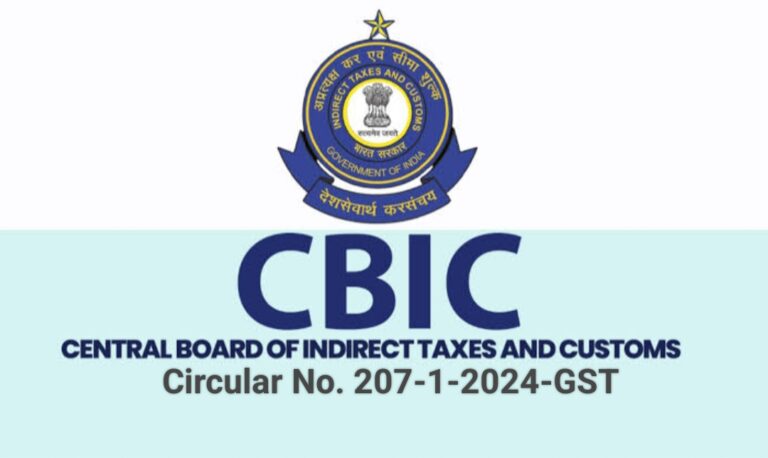CBIC Circular No. 207/1/2024-GST: Fixing Monetary Limits for Filing Appeals or Applications by the Department before GSTAT, High Courts and Supreme Court
Section 120 of the Central Goods and Services Tax Act, 2017 (CGST Act) empowers the Central Board of Indirect Taxes & Customs (CBIC) to set monetary limits for filing appeals or applications by tax authorities. The purpose is to streamline and regulate the appeal process under the GST regime.
Key Provisions of Section 120
- Authority to Set Limits: The CBIC, based on the GST Council’s recommendations, can issue orders or directions fixing monetary limits for filing appeals or applications by central tax officers.
- Non-preclusion Clause: If an appeal or application is not filed due to these limits, it doesn’t stop officers from filing appeals in other cases with similar issues.
- No Acquiescence Assumed: Not filing an appeal due to monetary limits doesn’t imply that the officer agrees with the decision.
- Consideration by Tribunals/Courts: Appellate bodies must consider the circumstances of not filing an appeal due to these limits.
New Monetary Limits for Appeals
Based on Section 120 of the CGST Act and Section 168 of the CGST Act, the CBIC, following the GST Council’s recommendations, sets the following monetary thresholds:
- Appeal in Goods and Services Tax Appellate Tribunal (GSTAT): Rs. 20 Lakhs
- Appeal in High Court: Rs. 1 Crore
- Appeal in Supreme Court: Rs. 2 Crores
Principles for Applying Monetary Limits
- Tax Disputes: Aggregate tax amount (including CGST, SGST/UTGST, IGST, and Compensation Cess) is considered.
- Interest Disputes: Amount of interest in dispute is considered.
- Penalty Disputes: Amount of penalty in dispute is considered.
- Late Fee Disputes: Amount of late fee in dispute is considered.
- Combined Interest, Penalty, and Late Fee: Aggregate amount is considered.
- Erroneous Refunds: Disputed refund amount is considered.
- Composite Orders: Total disputed amount in all appeals/demand notices is considered.
Exclusions from Monetary Limits
Certain cases are exempt from these monetary limits and require appeals to be filed regardless of the amount involved:
- Constitutional Validity: Cases where CGST/SGST/UTGST/IGST or GST Compensation to States Act provisions are held unconstitutional.
- Ultra Vires Rules/Regulations: Cases where rules or regulations under these Acts are deemed ultra vires.
- Government Orders/Circulars: Cases where government orders, notifications, or circulars are held ultra vires.
- Key Issues: Cases involving valuation, classification of goods/services, refunds, place of supply, or recurring issues requiring legal interpretation.
- Strictures or Costs: Cases with adverse comments or costs imposed against the government/department.
- Other Meritorious Cases: Cases deemed necessary by the Board for justice or revenue.
Appeals should not be filed solely based on the monetary limits; the merits of each case must be considered. The primary aim is to reduce unnecessary litigation and provide certainty in tax assessments.
No Precedent Value and Judicial Discipline
Cases where appeals are not filed due to these limits should not be considered precedents. Reviewing authorities must clearly record reasons for not filing appeals based on monetary limits. Tax officers should ensure no presumption of acceptance of decisions due to non-filing of appeals.
Representation in Tribunals and Courts
Departmental representatives must inform GSTAT or courts that appeals were not filed due to monetary limits. This ensures that no adverse inferences are drawn regarding the department’s acceptance of previous decisions.
By adhering to these guidelines, the CBIC aims to streamline the appeals process, reduce unnecessary litigation, and ensure fair and consistent tax administration.
To Access the official notification of the CBIC Circular CLICK HERE
Also Read: Recommendations of 53rd GST Council Meeting on June 22, 2024 in New Delhi
Read More
GST Rate Rationalisation Panel Reconstituted with Bihar Dy CM Samrat Chaudhary as Convenor
GST Council likely to Introduce a New Form GSTR-1A in the Upcoming Meeting Scheduled on June 22
